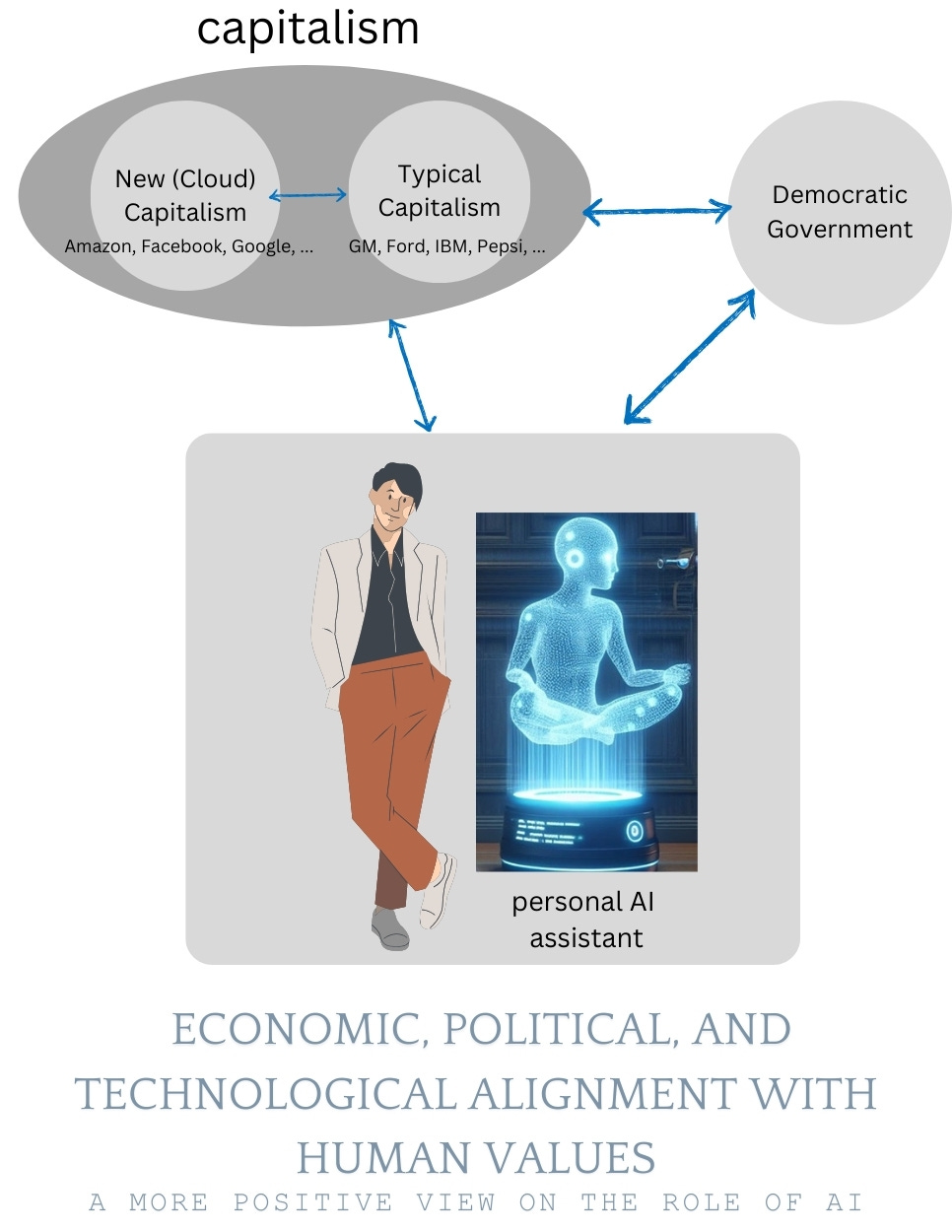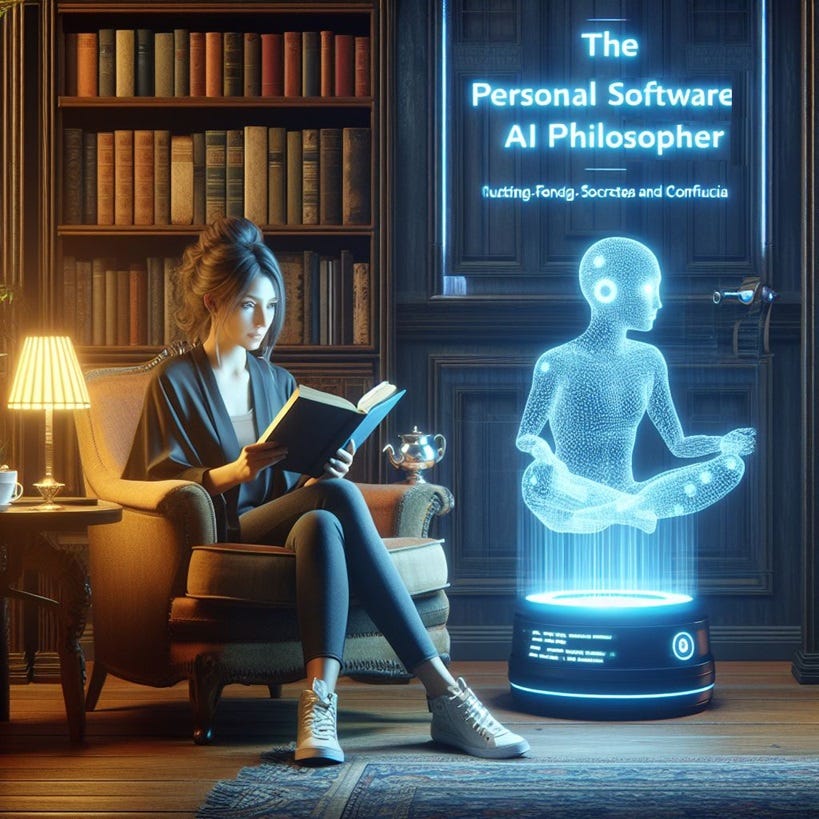Every essay in this publication ends with the same mention of a formal system of democratic governance in the age of AI. Most of the axioms of that system are about a Personal AI Assistant (PAIA), with which most citizens will eventually be endowed. In this post, we elaborate on those PAIA axioms in more detail and justify their place in a formal system.
The reader may have noticed that in the five background essays, not much attention has been paid to economic issues in a liberal democracy, and in particular how AI will affect those economic issues. So before we return to the PAIA axioms, let’s look at these economic issues. The picture below shows the contemporary shift of power between the political, the economic, and the democratic aspects of society, especially in the US.
The picture shows that in modern times, power has been draining away from people toward the government but even more so, toward corporations, especially the new corporations, which I call cloud capitalism in the picture.
The difference between social capitalism, (sometimes called virtual capitalism, or attention economy) and the old typical capitalism is that it does not produce material goods. Moreover, typical (material goods-producing) corporations use profits to pay their labor force, around 85% of the total profits. Whereas the new social corporations invest very little back into their labor force; I hesitate to put a percentage up because the estimates vary widely, they go as low as 10% for some corporations.
Where do the profits of social capitalism go? A large portion goes into a nebulous speculative financial cloud. From the point of view of this publication, this current flow of power cannot support a healthy lining up of AI, democracy, and human values.
The conventional wisdom is that AI will in fact increase the power of social capitalism. In the short term that is probably true, but in the long term, it does not have to be that way. The tension between the components in the picture above, especially about the direction of AI, will go up the US. We propose that we collectively have to change that flow.
Carey and Chomsky were concerned with the growth of corporate propaganda in the 20th century. Concern should be greater in the 21st century, as AI is rewriting propaganda rules through ubiquitous AI-controlled social media accounts. Human-controlled propaganda is no match for the scale and speed of AI-controlled propaganda.
Here is a crucial point that we make. Information about citizens is already accumulating in cloud silos controlled by the cloud capitalism. Not much of this information is under a citizen’s control, despite all the references to explicit consent that must obtained from a citizen before that information is being used, or worse yet, transferred or even sold between social capitalistic corporations.
This is where a PAIA would come in and to me, it looks like the hardest battles will be fought around this PAIA. Citizens of a democracy must win these battles if they are to finally get democracy right, bottom-up instead of top-down.
Let me be clear that this is not an attack on capitalism since the alternatives have never been better, but rather an attempt to save it by humanizing it, changing the more speculative and less productive aspects of it, and ultimately leading to increased human happiness, bringing back a sense of belonging to our society. Sounds pollyannish, but Polly Ana
Dystopian and Utopian Visions of AI
There are many dystopian and utopian versions of AI. Our thesis with regard to these two seemingly problematic possibilities, is that a bidirectional AI/democracy feedback loop, although utopian in nature is nevertheless worth pursuing. In other words, AI (through the PAIA) offers us a unique opportunity to get democracy right while democracy offers us a unique opportunity to get AI (and its PAIA) right.
Democracy, Late-Stage Capitalism, and the PAIA
Work in progress …
Democracy, Cloud Capitalism, and the PAIA
Work in progress …
Democracy, Human Happiness, and the PAIA
Work in progress …
Towards a Formal Theory of Democratic Governance in the Age of AI
Axiom 1: Humans Have Free Will
Axiom 2: A consistent (=non-contradictory) set of democratic principles and human values exists
Axiom 3: Citizens are endowed with a personal AI assistant (PAIA), whose security, convenience, and privacy are under citizen’s control
Axiom 4: All PAIAs are aligned with the set described in axiom 2
Axiom 5: A PAIA always asks for confirmation before taking ANY action
Axiom 6: Citizens may decide to let their PAIAs vote for them, after confirmation
Axiom 7: PAIAs monitor and score the match between the citizen’s political inclinations and the way their representatives in Congress vote and campaign
Axiom 8: A PAIA upholds the citizen’s decisions and political stands, and never overrides them
Axiom 9: Humans are primarily driven by a search for relevance
Axiom 10: The 3 components of relevance can be measured by the PAIA. This measurement is private
Axiom 11: Humans configure their PAIAs to advise them on ways to increase the components of their relevance in whatever ways they find desirable
Axiom 12: A PAIA should assume that citizen lives in a kind, fair, and effective democracy and propose ways to keep it as such








